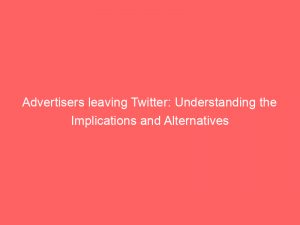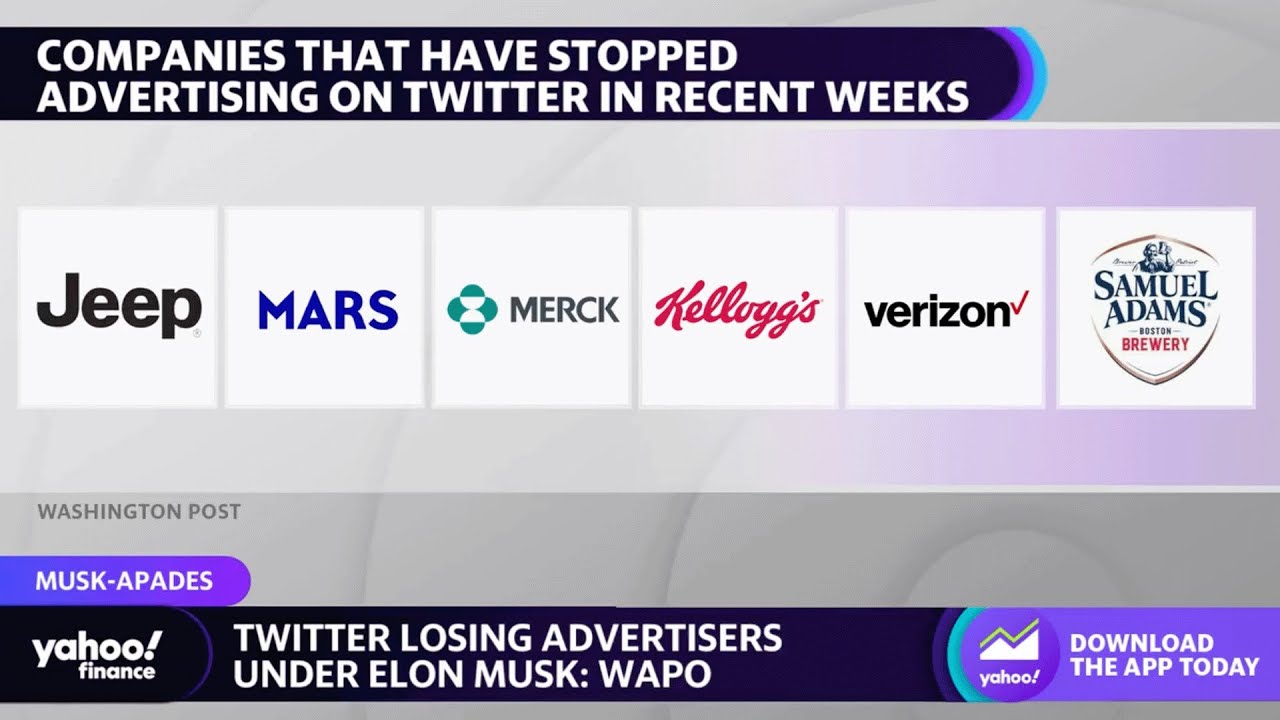- advertisers leaving twitter
- Advertisers Leaving Twitter Under Elon Musk’s Leadership
- Massive Decline in Top Advertisers on Twitter
- Seven Major Advertisers Decrease Spending on Twitter
- Chevrolet, Chipotle, and Other Companies Halt Twitter Ads
- Elon Musk’s Controversial Actions Impact Advertiser Confidence
- Criticism of Twitter’s Blue Checkmark Verification System
- 12 Pharmaceutical Giants Pull Out of Twitter Advertising
- Over a Third of Top Twitter Marketers Discontinue Ads
- Twitter’s Heavy Reliance on Advertising Revenue
- Concerns About Musk’s Control and Inflammatory Content Drive Advertisers Away
In the fast-paced realm of social media, where online giants battle for user attention and advertising dominance, Twitter has recently witnessed a significant shakeup. The arrival of Elon Musk, the enigmatic entrepreneur heralded for his audacious ventures, has thrown the platform into a whirlwind of uncertainty.
As news of top advertisers bidding farewell to Twitter spreads like wildfire, questions arise about Musk’s tight grip on the reins and his penchant for controversial actions. Will this tumultuous turn of events mark the beginning of a downward spiral for the once-thriving realm of tweets and hashtags?
Let’s delve further into the escalating concerns and unravel the captivating tale of advertisers fleeing from the Twitterverse.
| Item | Details |
|---|---|
| Topic | Advertisers leaving Twitter: Understanding the Implications and Alternatives |
| Category | Ads |
| Key takeaway | In the fast-paced realm of social media, where online giants battle for user attention and advertising dominance, Twitter has recently witnessed a significant shakeup. |
| Last updated | December 27, 2025 |
advertisers-leaving-twitter">advertisersleaving twitter
Advertisers are leaving Twitter due to concerns about Elon Musk’s control and inflammatory content on the platform. Since Musk took over, Twitter has lost 50 of its top 100 advertisers, with several other advertisers significantly reducing their advertising on the platform.
Companies like Chevrolet, Chipotle, Ford, Jeep, Kyndryl, Merck, and Novartis have halted Twitter ads or been reported to have done so. Musk’s controversial actions, including amplifying conspiracy theories and reinstating banned accounts, have contributed to this trend.
The blue checkmark system for verifying accounts has also faced criticism. Advertisers are reevaluating their presence on Twitter because of the influx of racist and antisemitic posts since Musk’s acquisition.
Twitter’s heavy reliance on advertising, with nearly 90% of its revenue coming from advertising in 2020, makes these departures significant for the platform.
Key Points:
- Advertisers leaving due to concerns about Elon Musk’s control and inflammatory content on Twitter.
- Twitter has lost 50 of its top 100 advertisers since Musk took over, with others reducing their advertising.
- Chevrolet, Chipotle, Ford, Jeep, Kyndryl, Merck, and Novartis have halted Twitter ads or been reported to have done so.
- Musk’s controversial actions, including amplifying conspiracy theories and reinstating banned accounts, have contributed to the trend.
- The blue checkmark verification system has also faced criticism.
- Departures are significant for Twitter as nearly 90% of its revenue in 2020 came from advertising.
Sources
https://www.npr.org/2022/11/25/1139180002/twitter-loses-50-top-advertisers-elon-musk
https://www.washingtonpost.com/technology/2022/11/22/twitter-advertiser-exodus-musk/
https://www.nytimes.com/2022/11/01/technology/elon-musk-twitter-advertisers.html
https://www.businessinsider.com/twitter-lost-half-top-advertisers-elon-musk-takeover-report-2022-11?op=1
Check this out:
? Pro Tips:
1. Consider diversifying your advertising strategy to include other platforms like Facebook and Google, which may be less susceptible to controversial actions and changes in leadership.
2. Prioritize monitoring and addressing any inflammatory or offensive content related to your brand that may appear on Twitter, as Musk’s actions have led to an influx of such posts on the platform.
3. Stay updated on the latest changes in Twitter’s content moderation practices, as these changes can affect the suitability of the platform for your advertising campaigns.
4. Assess the timing of your Twitter advertising campaigns, taking into account events like the holiday shopping season and major sporting events to maximize their effectiveness.
5. Explore alternative ways to reach your target audience, such as influencer marketing or partnerships with relevant websites and blogs, to minimize reliance on advertising platforms like Twitter that may be subject to significant fluctuations and controversy.
Advertisers Leaving Twitter Under Elon Musk’s Leadership
Since Elon Musk took over Twitter, the platform has experienced a significant decline in advertiser support. In fact, Twitter has lost 50 of its top 100 advertisers, signaling a shift in confidence and investment in the social media giant.
The impact of Musk’s leadership on advertisers can be attributed to several key factors, including controversial actions, the amplification of conspiracy theories, and reinstating banned accounts.
One of the major concerns raised by advertisers is the inflammatory content that Musk has contributed to on the platform. His engagement in controversial discussions has led to an influx of racist and antisemitic posts, creating a challenging environment for brands to associate with.
Moreover, Musk’s takeover has also brought criticism to Twitter’s blue checkmark system for verifying accounts, which has been deemed unreliable and ineffective.
Massive Decline in Top Advertisers on Twitter
The decline in advertiser support for Twitter is staggering. Advertisers have spent nearly $2 billion on Twitter ads since 2020, but now, seven major advertisers have significantly reduced their advertising on the platform.
This decline has been particularly evident in companies such as Chevrolet, Chipotle, Ford, Jeep, Kyndryl, Merck, and Novartis, which have either halted their Twitter ads or have been reported to have done so.
Additionally, the statistics reveal that dozens of top Twitter advertisers, including 14 of the top 50, have stopped advertising since Musk’s acquisition. This loss represents a significant blow to Twitter’s advertising revenue and highlights the lack of confidence advertisers now have in the platform.
Seven Major Advertisers Decrease Spending on Twitter
It’s not just the top advertisers that are pulling back; seven major companies have decreased their spending on Twitter. This reduction in advertising campaigns is a clear indication of the concerns surrounding Musk’s control and the inflammatory content that has been prevalent on the platform.
This decrease in spending has had a significant impact on Twitter’s revenue, especially considering the holiday shopping season and the World Cup have paralleled the platform’s advertising slowdown. These key events typically drive advertising revenues for social media platforms, but with Twitter’s declining advertiser support, the potential for revenue growth has been severely hindered.
Some examples of the major companies that have decreased their spending on Twitter include Chevrolet, Chipotle, Ford, Jeep, Kyndryl, Merck, and Novartis. These companies have either halted their Twitter ads altogether or have taken steps to reduce their presence on the platform.
Chevrolet, Chipotle, and Other Companies Halt Twitter Ads
Among the companies that have decided to halt Twitter ads, notable names like Chevrolet and Chipotle stand out. These companies have made a conscious decision to disassociate from Twitter due to concerns about Musk’s control and the presence of inflammatory content on the platform.
By halting their ads, these companies are sending a clear message to Twitter that they will not support a platform that allows for the dissemination of harmful and offensive content. This move also reflects these companies’ commitment to protecting their brand image and ensuring they are associated with platforms that align with their values.
Elon Musk’s Controversial Actions Impact Advertiser Confidence
Elon Musk’s controversial actions have also played a significant role in impacting advertiser confidence. His engagement in discussions that amplify conspiracy theories and his decision to reinstate banned accounts have raised serious concerns among advertisers.
These actions not only undermine the credibility of Twitter but also create an environment that advertisers do not want their brands to be associated with.
Advertisers are increasingly reevaluating their presence on Twitter due to recent changes made by Musk, including workforce reduction and the implementation of new content moderation practices. These changes further raise doubts about the platform’s ability to effectively manage and address issues like harassment, hate speech, and misinformation.
Criticism of Twitter’s Blue Checkmark Verification System
Twitter’s blue checkmark verification system has long been a subject of criticism. The system, designed to verify the authenticity of accounts, has been deemed unreliable and ineffective.
Advertisers, in particular, have expressed concerns about the lack of transparency and the ability for accounts with controversial or offensive content to be verified.
The criticism of this verification system heightens advertisers’ concerns about brand safety on the platform. To maintain their reputation and ensure their brand is not associated with questionable accounts or content, advertisers are increasingly looking for alternative platforms with more robust verification processes.
12 Pharmaceutical Giants Pull Out of Twitter Advertising
The pharmaceutical industry, a significant player in the advertising landscape, has also made a clear move away from Twitter. Twelve pharmaceutical giants have reportedly stopped buying Twitter ads, citing concerns about Musk’s control and the presence of inflammatory and harmful content on the platform.
The decision of these pharmaceutical companies to pull out of Twitter advertising is striking. This industry places great importance on brand reputation and compliance, and their withdrawal reflects the lack of confidence they have in Twitter’s ability to maintain a safe and suitable advertising environment.
Over a Third of Top Twitter Marketers Discontinue Ads
Advertisers’ dissatisfaction with Twitter under Musk’s leadership is further evidenced by the fact that over a third of Twitter’s top 100 marketers have not advertised on the platform in the past two weeks. This significant withdrawal of advertising campaigns is a clear indication of the loss of trust and confidence many advertisers are experiencing.
The decision to discontinue ads on Twitter is a strategic one for these marketers. Compared to other platforms like Facebook and Google, Twitter is not a critical part of advertisers’ ad strategies and can easily be removed without significant implications for their overall marketing efforts.
Twitter’s Heavy Reliance on Advertising Revenue
Twitter’s heavy reliance on advertising revenue makes the declining advertiser support a critical issue for the platform. Nearly 90% of Twitter’s revenue in 2020 came from advertising, highlighting the platform’s dependence on brands and their advertising dollars to sustain its business model.
With the loss of 50 of its top 100 advertisers and the decrease in spending from major companies, Twitter’s advertising revenue potential has taken a severe hit. This decline in revenue could have ripple effects on the platform’s ability to innovate, invest in user experience enhancements, and attract new users.
Concerns About Musk’s Control and Inflammatory Content Drive Advertisers Away
Overall, the departure of advertisers from Twitter can be attributed to concerns about Elon Musk’s control and the presence of inflammatory content on the platform. Advertisers are actively reevaluating their presence on Twitter due to recent changes made under Musk’s leadership, such as workforce reduction and new content moderation practices.
The actions and decisions of Musk have created an environment that advertisers do not want to be associated with, leading to a loss of trust and confidence in the platform. The advertising slowdown on Twitter coincides with key events like the holiday shopping season and the World Cup, further compounding the negative impact on the platform’s revenue potential.
In the face of these challenges, advertisers are exploring alternative platforms that offer more reliable and brand-safe advertising environments. Twitter must address the concerns raised by advertisers if it hopes to retain and attract advertisers in the future.
Optimized content based on recent advertiser behavior.
Advertising Platform for Marketers • Programmatic Advertising • Self-Serve DSP Platform • Performance Marketing Tips • Buy Traffic











